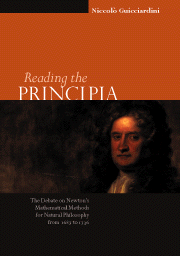 Reading the Principia
Reading the Principia 7 - Britain: in the wake of the Principia
Published online by Cambridge University Press: 29 March 2010
Summary
Purpose of this chapter
In this chapter I will try to chart the failures and successes that the British Newtonians encountered in reading Newton's magnum opus. I will abandon technical matters and I will adopt a descriptive level of presentation, while in the next chapter the reader will find some information on the mathematical approach to natural philosophy developed in the British school. Even though my analysis is far from complete, I hope that the material collected allows some generalizations on the Newtonian school. I am particularly interested in identifying the validation criteria that were shared among Newton's closest associates. After the publication of the Principia, and particularly during the priority dispute with Leibniz, Newton surrounded himself with a small group of mathematicians with whom he shared his discoveries. They adhered to many of Newton's methodological values. As a bonus they were often helped by Newton in their academic careers: e.g. David Gregory was appointed to the Savilian Chair of Astronomy in Oxford through Newton's recommendation. The same holds true for the appointment of Edmond Halley to the Savilian Chair of Geometry, Colin Maclaurin to the Chair of Mathematics in Edinburgh, or William Whiston to the Lucasian Chair in Cambridge. We will have to pay some attention to the unpublished, private, side of their scientific production. As will become clearer in the next chapter, the values and expectations that the Newtonians shared oriented their research along lines different from those pursued by the Leibnizians.
- Type
- Chapter
- Information
- Reading the PrincipiaThe Debate on Newton's Mathematical Methods for Natural Philosophy from 1687 to 1736, pp. 169 - 194Publisher: Cambridge University PressPrint publication year: 1999


